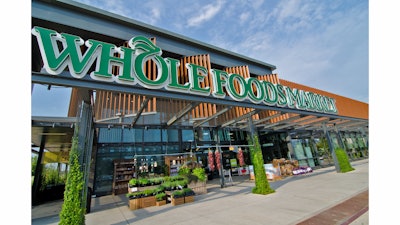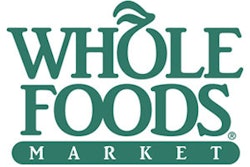
Whole Foods Market has launched “Responsibly Grown,” a tiered produce rating system that assesses growing practices that impact human health and the environment. The new rating system labels fresh fruits, vegetables and flowers as “good,” “better” or “best” to help shoppers make more informed choices in the produce and floral departments, and it prohibits some of the most hazardous neurotoxins still allowed in agriculture.
Prohibited pesticides include several organophosphate insecticides, which recent studies indicate can impair neurological development in children born to mothers exposed in diet or by working in agriculture and living in nearby communities. A full list of prohibited and restricted pesticides may be found on the Responsibly Grown web page.
“After three years of research and planning, Responsibly Grown is the result of our collaboration with suppliers, scientists and issue experts to continue our strong commitment to organic, while embracing additional important topics and growing practices in agriculture today,” said Matt Rogers, global produce coordinator at Whole Foods Market. “We are excited to broaden the conversation to recognize additional growing practices and drive more transparency in the industry.”
To earn a “good” rating, a farm must take 16 steps to protect air, soil, water, and human health. Growers must also comply with the Responsibly Grown pesticide policy, which restricts growers to using only U.S. Environmental Protection Agency registered pesticides, regardless of the country of origin. In other words, farms outside the U.S. cannot supply Whole Foods Market with fresh fruits, vegetables, and flowers grown using pesticides not allowed in the U.S., with very limited exceptions including for crops not grown in the U.S. Growers also cannot use biosolids or irradiation and must commit to GMO transparency.
“I applaud the courage and conviction of Whole Foods Market, and its growers and suppliers, for taking decisive action on more than a dozen high-risk pesticides. The next generation of Americans will be the primary beneficiaries of this bold step,” according to Dr. Charles Benbrook, research professor and program leader for the Center for Sustainable Agriculture at Washington State University.
A “better” rating indicates advanced performance and a “best” rating indicates exceptional, industry-leading performance in a scoring system covering multiple topics in each of these categories:
- Pest management (e.g., using beneficial insects to control pests)
- Farmworker welfare (e.g., providing protective equipment for workers)
- Water conservation and protection (e.g., using efficient irrigation techniques)
- Enhancing soil health (e.g., adding compost to soil; planting cover crops)
- Ecosystems and biodiversity (e.g., planting wildflowers to restore natural bee habitat for pollinator protection)
- Waste reduction (e.g., recycling plastics used in the field)
- Air, energy and climate (e.g., solar panels for renewable energy)
The program seeks to reward growers for existing accomplishments and raise the bar to encourage continuous improvement while minimizing additional burdens for growers.
"Being truly sustainable means more than just not using harmful chemicals. Energy conservation is a big focus for us so we installed solar panels on the packing house at our Pennsylvania farm which accounts for 20 percent of energy consumption on the farm," said Tom Beddard, founder and grower at Lady Moon Farms that has a "best" rating for their vegetables. "We incorporate many different practices with a promise to put more into the soil than we take out, ensuring more fertile farms and making the earth a safer place for all of us. We're proud to share these practices with Whole Foods Market shoppers through Responsibly Grown."
Pollinator protection is another focus of the program that is likely to resonate with Whole Foods Market shoppers. Responsibly Grown addresses the primary threats facing pollinators including high risk pesticide use, loss of habitat, and disease spread from managed bees to wild pollinators. Four of the most common neonicotinoids currently allowed in the U.S. will be prohibited for growers to reach the Responsibly Grown “best” level. Many growers, scientists, environmentalists, and beekeepers are concerned about the impact of these pesticides on bees and other pollinators.
"As a result of this program, we are already hearing from fruit and vegetable farmers who are creating wildflower-rich habitat for bees, and working to reduce or eliminate pesticides on farms from New Jersey to Iowa to California," said Eric Mader, assistant pollinator program director for The Xerces Society for Invertebrate Conservation. "This type of action is the first and most important step in reversing the ongoing decline of bees, butterflies, and other pollinators."















